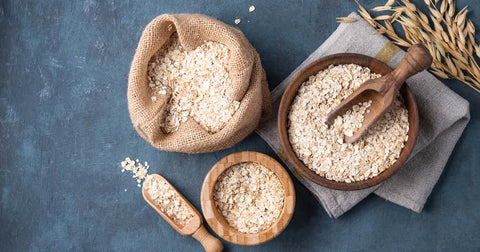Oats, a whole-grain powerhouse, have long been celebrated for their versatility and nutritional benefits. From heart health to digestive wellness, oats offer a wealth of advantages. But with various types of oats available, including rolled oats, quick oats, and steel-cut oats, you might be wondering which one is the best choice for your gut health.

This article delves into the world of oats, comparing rolled oats vs. quick oats, exploring their nutritional differences, and highlighting their digestive benefits. We'll also discuss the importance of food intolerance awareness and how our food sensitivity test kit can help you make informed choices about your diet.
Understanding Oats: A Nutritional Powerhouse
Oats are a type of whole grain packed with essential nutrients, including:
-
Fiber: Promotes digestive health, regulates blood sugar levels, and contributes to feelings of fullness.
-
Beta-glucan: A type of soluble fiber that can help lower cholesterol levels.
-
Vitamins and Minerals: Oats are a good source of B vitamins, iron, magnesium, and zinc.
-
Antioxidants: They contain antioxidants that protect your cells from damage.
Rolled Oats vs. Quick Oats: Processing and Texture
The main difference between rolled oats and quick oats lies in their processing:
-
Rolled Oats: Also known as old-fashioned oats, these are oat groats that have been steamed and rolled flat. They have a slightly chewy texture and take a bit longer to cook than quick oats.
-
Quick Oats: These are rolled oats that have been further processed, typically by cutting them into smaller pieces or rolling them thinner. This results in a faster cooking time and a smoother texture.
Steel-Cut Oats vs. Rolled Oats: A Nutritional Comparison

Steel-cut oats, also known as Irish oats or pinhead oats, are oat groats that have been chopped into smaller pieces. They have a chewier texture and take longer to cook than rolled oats.
While all types of oats offer similar nutritional benefits, steel-cut oats have a slightly lower glycemic index (GI) than rolled oats and quick oats. This means they cause a slower and more gradual rise in blood sugar levels.
Healthiest Oats: A Matter of Preference
All types of oats are considered healthy and nutritious. The "healthiest" choice depends on your individual preferences and dietary needs.
-
For gut health: Oats, in general, are a good source of fiber, which promotes digestive health and feeds beneficial gut bacteria.
-
For blood sugar control: Steel-cut oats might be slightly preferable due to their lower GI.
-
For convenience: Quick oats are the fastest to cook, while rolled oats offer a good balance of convenience and texture.
Which Oats are Best?
The best oats for you depend on your individual preferences and needs. Consider factors like:
-
Cooking time: Quick oats are the fastest, followed by rolled oats, and then steel-cut oats.
-
Texture: Steel-cut oats have the chewiest texture, while quick oats are the smoothest.
-
Blood sugar control: Steel-cut oats have the lowest GI.
Oatmeal for Digestion: A Gut-Friendly Choice
Oatmeal is a good source of soluble fiber, which can help:

-
Relieve constipation: Fiber adds bulk to stool and promotes regularity.
-
Reduce bloating: Soluble fiber can help absorb excess water in the intestines, reducing bloating.
-
Support a healthy gut microbiome: Fiber acts as a prebiotic, nourishing the beneficial bacteria in your gut.
Food Intolerance and Oatmeal: A Consideration
While oats are generally well-tolerated, some individuals might experience digestive issues after consuming them. This could be due to:
-
Gluten contamination: While oats themselves are gluten-free, they can sometimes be contaminated with gluten during processing. Look for certified gluten-free oats if you have celiac disease or gluten sensitivity.
-
Food intolerance or sensitivity: Some people might have a sensitivity to oats or other components of oatmeal, such as milk or added sweeteners.
Food Sensitivity Test Kit: Identify Your Triggers
If you experience digestive discomfort after consuming oatmeal or other foods, consider taking a food sensitivity test kit. This can help you identify specific foods that might be triggering your symptoms, allowing you to make informed dietary choices and improve your gut health.
Key Takeaways:

-
Rolled oats and quick oats are both healthy and nutritious options.
-
Steel-cut oats have a lower GI and might be slightly preferable for blood sugar control.
-
Oatmeal is a good source of fiber, which can benefit digestive health.
-
If you experience digestive issues after consuming oats, consider a food sensitivity test to identify potential food intolerances.
Remember, this article is intended for informational purposes only and should not be considered a substitute for professional medical advice. If you have any concerns about your health or dietary choices, consult a qualified healthcare professional.
Frequently Asked Questions:
1. Are quick oats as healthy as rolled oats or steel-cut oats?
While quick oats are slightly more processed than rolled or steel-cut oats, they still offer similar nutritional benefits, including fiber and essential nutrients. The main difference lies in their texture and cooking time.
2. Can I eat oatmeal every day?
Yes, oatmeal can be a healthy part of your daily diet. It's a good source of fiber, which promotes digestive health and helps regulate blood sugar levels. However, it's important to vary your diet and include other whole grains, fruits, and vegetables for optimal nutrition.
3. What are some healthy toppings I can add to my oatmeal?
Enhance your oatmeal with toppings like fresh or frozen fruit, nuts, seeds, cinnamon, and a drizzle of honey or maple syrup. You can also add protein powder or Greek yogurt for an extra protein boost.
4. I'm experiencing bloating and gas after eating oatmeal. Could it be a gluten intolerance?
While oats themselves are gluten-free, they can sometimes be contaminated with gluten during processing. If you have celiac disease or gluten sensitivity, look for certified gluten-free oats. Bloating and gas could also be due to a sensitivity to oats themselves or other ingredients in your oatmeal, such as milk or added sweeteners.
5. How can a food sensitivity test help me with my digestive issues?
A food sensitivity test can help identify specific foods that might be triggering your digestive discomfort, including oats or other common culprits like dairy or wheat. This information can empower you to make informed dietary choices and improve your gut health.


.png?v=1737390083)
.png?v=1737187409)

